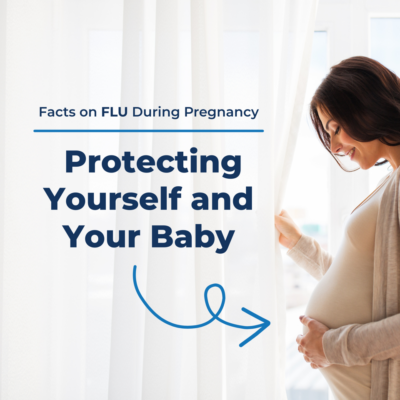- Flu Facts
- Flu Vaccine Information
- Flu Prevention
Facts on Flu During Pregnancy: Protecting Yourself and Your Baby

Having a baby can be a very exciting but also stressful experience. Keeping track of appointments, sonograms, staying healthy, and getting all the baby gear, necessities, and diapers can be a lot to remember. But one important thing not to forget is getting vaccinated against influenza (the flu) each year. It’s the single most important thing you can do to protect yourself and your baby from the flu.
Fact: The Flu is Serious for Pregnant Women
Pregnancy causes changes to the immune system, heart, and lung function. Because of this, pregnant women (and women up to two weeks postpartum) are more likely to experience complications from the flu. Having the flu while pregnant can increase the risk of premature labor and delivery, hospitalization or even death.
Fact: The Flu Vaccine is Safe and Effective
Getting a flu shot reduces a pregnant person’s risk of being hospitalized with flu by 40 percent. Also, receiving a flu vaccine during pregnancy reduces the risk of flu-associated acute respiratory infection in pregnant people by 50 percent. Millions of pregnant women over many years have safely received a flu vaccine. There is no increased risk for miscarriage after flu vaccination during pregnancy and it is not associated with birth defects. The CDC recommends that everyone six months and older receive a flu vaccine every year. While the ideal time to get your flu shot is on or before the end of October, it’s not too late to get yours now if you haven’t already! Vaccination can still be beneficial as long as flu viruses are circulating.
Since infants can’t receive a flu vaccine until they are six months old, getting it during pregnancy is the best way to pass on protection to your newborn. Studies show that babies born to mothers who’ve received a flu vaccine during pregnancy are 70 percent less likely to suffer from the flu and 81 percent less likely to be hospitalized with the flu.
Fact: 2 Protects 2
Not only is the flu serious during pregnancy, but whooping cough is too. Whooping cough is another disease that can also be deadly for babies. Babies do not start building their own protection against whooping cough until they get vaccinated at two months old. This leaves babies unprotected in the first months of their life when they are at the highest risk of getting very sick if they get whooping cough. CDC recommends all women receive the vaccine for whooping cough (called TDAP) between the 27th and 36th week of each pregnancy. Getting vaccinated reduces the risk of whooping cough by 78 percent.
Protection for your baby starts during pregnancy! Vaccination passes along antibodies so that your baby is healthy. Ask your healthcare provider about receiving your flu and TDAP vaccines during your pregnancy.
Five Tips for Additional Protection:
Wear a mask to help prevent flu infection and the spread of flu to others.
Wash your hands frequently to prevent the spread of germs. If soap and water are not available, use a hand sanitizer.
Make sure to cough into your elbow instead of your hands to lower the risk of spreading germs.
Avoid touching your eyes, nose, or mouth: This also keeps germs outside of your body.
Clean and disinfect surfaces and objects: It’s especially important on high-touch areas like countertops, sinks, doors and other places many people touch.
The CDC reports that seasonal influenza activity has remained high this flu season Pediatric deaths are already nearing 100, along with higher hospitalization rates. Protect yourself and your baby by getting vaccinated against the flu.

